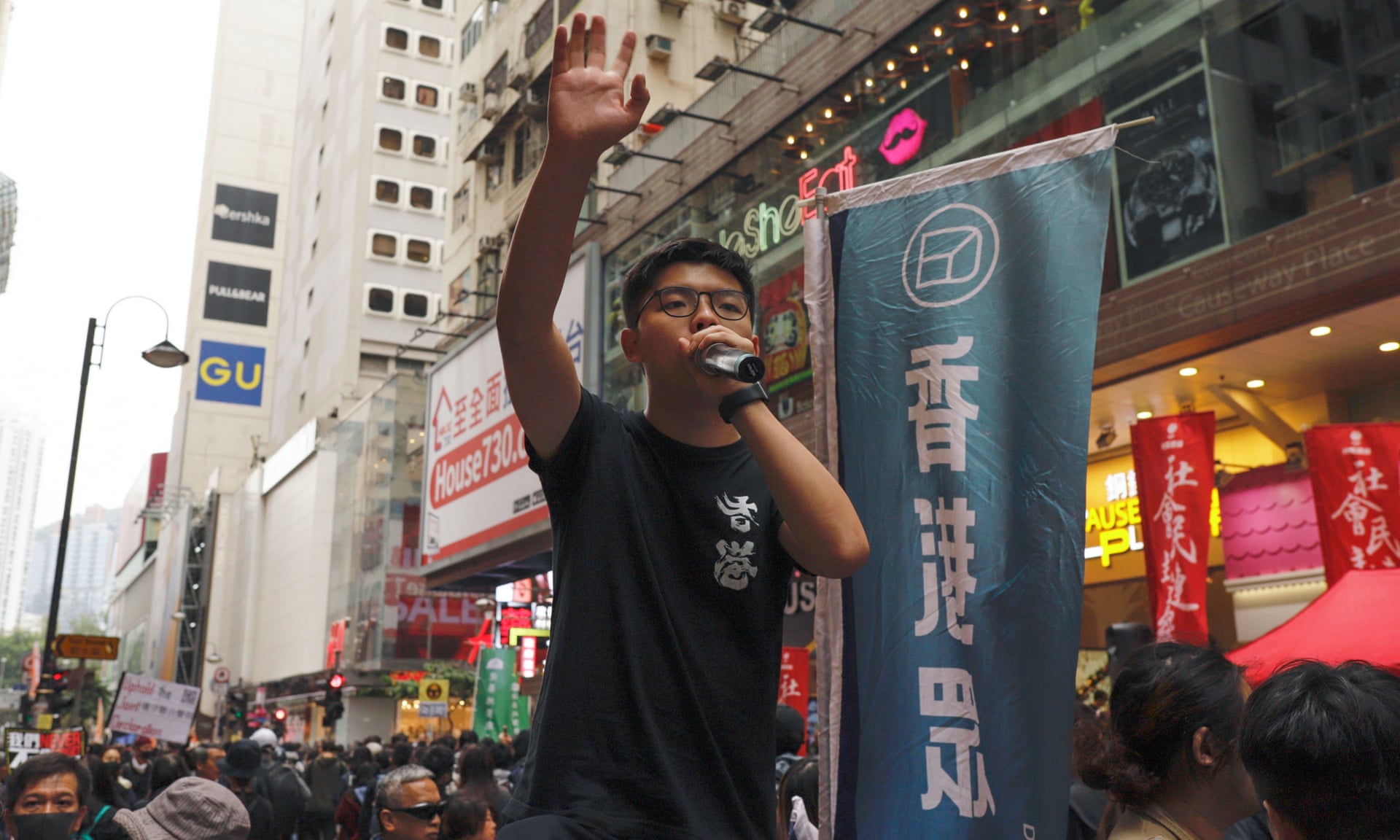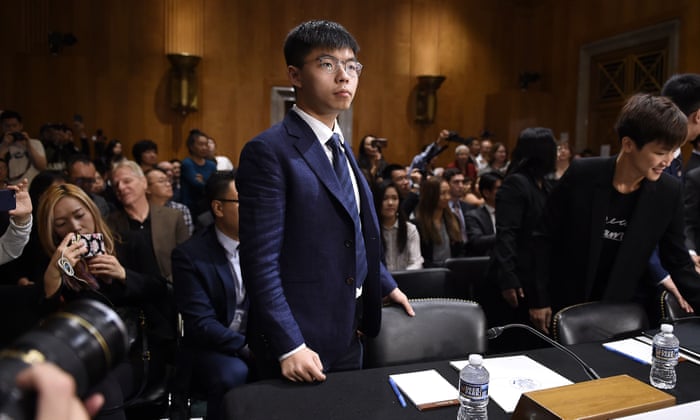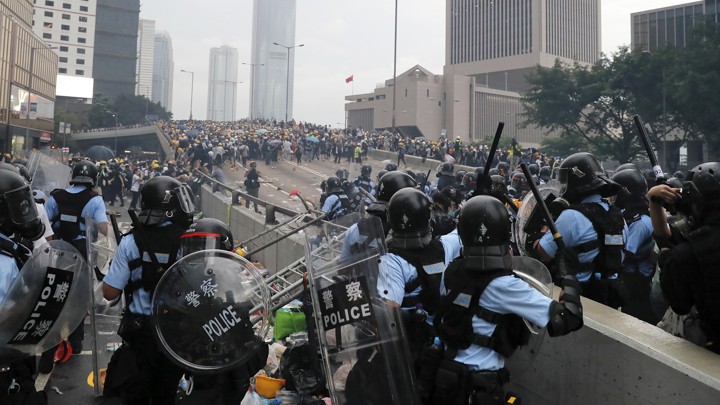The Hong Kong protests leader, a veteran activist at just 23, on his extraordinary decade – and what comes next
By Tim Adams

Joshua Wong addressing the crowd in Hong Kong, 1 January 2020.

Joshua Wong addressing the crowd in Hong Kong, 1 January 2020.
I don’t know if it counts as a demographic anomaly or a new world order, but our social media decade has seen the emergence of teenage political changemakers – the guerrilla wing of influencer culture.
While Greta Thunberg may have become the most recognisable of these adolescent activists, the model was established by Joshua Wong, who at the age of 14 engineered a rare political climbdown by the Hong Kong government, and by 17 was on the cover of Time magazine as “the Face of Protest”.
Wong, now 23, and having spent many months in prisons and detention centres, is the gnarled veteran leader of the “umbrella movement” against creeping Chinese authoritarianism.
Wong, now 23, and having spent many months in prisons and detention centres, is the gnarled veteran leader of the “umbrella movement” against creeping Chinese authoritarianism.
In a blurb to this book Thunberg describes him as “the future that has already come”.
Wong’s story is not unlike Thunberg’s to the extent that a stubborn school-based protest that might have once been confined to the human-interest pages of the local newspaper quickly became first a national and then a global concern.
This book is a memoir of an extraordinary decade in which Wong went from a nerdy obsession with Marvel comics to a Netflix documentary in which he was characterised as a superhero for democracy. It is also a call to arms to that generation that has known nothing but Instagram and Snapchat – a manifesto to “follow news sites for warning signs of political polarisation”, to use “fact-checking media”, to get out from behind their screens “to attend rallies and help organise election campaigns” and to remember, above all, any effort to preserve democracy “starts with one voice, one flyer and one speech”.
Wong half-believes he was born to the role.
This book is a memoir of an extraordinary decade in which Wong went from a nerdy obsession with Marvel comics to a Netflix documentary in which he was characterised as a superhero for democracy. It is also a call to arms to that generation that has known nothing but Instagram and Snapchat – a manifesto to “follow news sites for warning signs of political polarisation”, to use “fact-checking media”, to get out from behind their screens “to attend rallies and help organise election campaigns” and to remember, above all, any effort to preserve democracy “starts with one voice, one flyer and one speech”.
Wong half-believes he was born to the role.
His Christian parents, who married in the weeks after the Tiananmen Square massacre named him Joshua after the Old Testament hero of Jericho, bringing down walls with his trumpet solo.
His mother recalls him babbling like an orator from birth, and dyslexia meant that he learned to be a speechmaker to prove his intelligence.
His first protest movement was for an improvement in school dinners at the United Christian College in Hong Kong.
He graduated quickly to organising against a new national curriculum, announced by the island’s government.

Joshua Wong at a US congressional hearing on China in September 2019.
Wong was part of the first school year to have been born after Britain’s handover of Hong Kong to China in 1997.
The new curriculum, with its insistence on a “recognition of identity”, came with a manual that praised the Chinese Communist party as “an advanced and selfless regime” and argued that “toxic bipartisan politics” in the west led to the “suffering of its people”.
Wong and his best mate, Ivan Lam, created a Facebook page outlining resistance to the curriculum and set up street stalls and staged small-scale sit-ins to channel protest.
By 2012, a tight group of friends had grown to 10,000 Scholarism followers; Wong spent nearly every evening after school giving soapbox speeches and press interviews.
By 2012, a tight group of friends had grown to 10,000 Scholarism followers; Wong spent nearly every evening after school giving soapbox speeches and press interviews.
In July that year, he led a mass protest of 100,000 people and by August – just before a new term started – his activists occupied the Admiralty Square outside the government headquarters; Ivan Lam went on hunger strike.
By day nine of the occupation, the government chief executive, CY Leung, withdrew the plans for the “brainwashing curriculum”.
That success was only the beginning for Wong.
The next battle was over the government’s flaky commitment to the people’s right freely to elect its chief executive.
Beijing’s backtracking on that promise in 2017 forced the Scholarism activists back out onto the streets.
Admiralty Square had been fenced off, but in a rallying speech Wong called for supporters to scale the barrier.
He was pulled down from the top of the fence by riot police.
It was only when he was released on bail after 48 hours in solitary confinement that he got to see the news footage of the demonstration.
The following day 200,000 protesters had descended on the square; when the police fired teargas into the crowd, many of the protesters had defended themselves with umbrellas – and a new movement had been born.
Ever since, Wong has been in and out of jail while the authorities have tried and failed to subdue the ongoing protests.
Ever since, Wong has been in and out of jail while the authorities have tried and failed to subdue the ongoing protests.
Much of the second half of this book, which is sometimes written with the flattened tone of a court report or legal document, consists of Wong’s letters from prison, trying to keep up with events on the outside, while characteristically taking up causes on the inside, including a campaign to outlaw the prison practice of shaving inmates’ hair.
On his release Wong sought to use his platform to argue that what began as Hong Kong’s student protest is increasingly all of our concern.
On his release Wong sought to use his platform to argue that what began as Hong Kong’s student protest is increasingly all of our concern.
Hong Kong is in many ways the test case, his book insists, not just for China to try its authoritarian muscle but also as part of a “much broader threat to global democracy”.
In May 2019 Wong returned to prison for seven weeks for violating a court injunction involving the umbrella movement, nearly 6,000 of whose number had by then been arrested.
His greatest regret, he joked at the time, was that he would miss the latest Marvel Avengers film. Wong had watched its predecessor many times – and seen in its subtitle a lesson for superheroes, however modest, however young, the world over.
“The ‘infinity war’ that has ravaged Hong Kong for years, I’m afraid, may be soon coming to a political theatre near you…”
• Unfree Speech: The Threat to Global Democracy and Why We Must Act Now by Joshua Wong is published by Penguin (£9.99) To order a copy go to guardianbookshop.com or call 020-3176 3837
• Unfree Speech: The Threat to Global Democracy and Why We Must Act Now by Joshua Wong is published by Penguin (£9.99) To order a copy go to guardianbookshop.com or call 020-3176 3837
 Riot police prepare to throw tear gas at protesters in Hong Kong.
Riot police prepare to throw tear gas at protesters in Hong Kong.